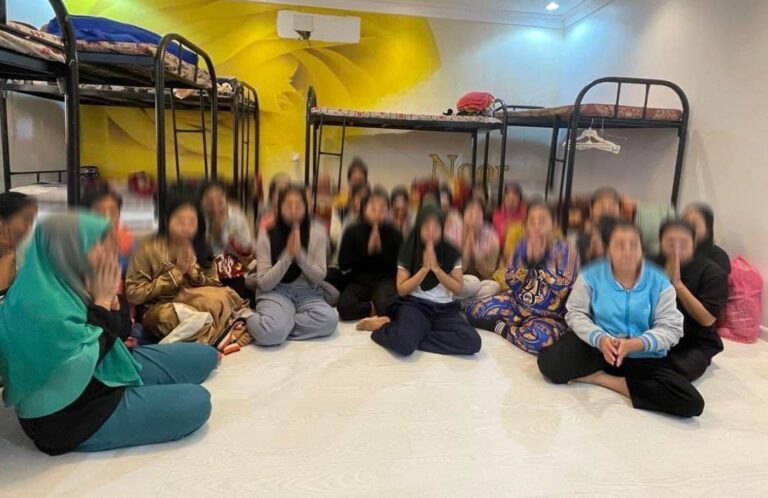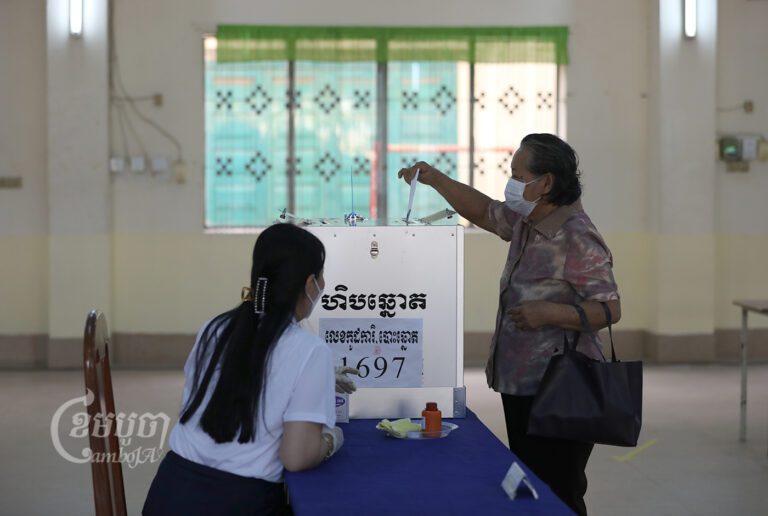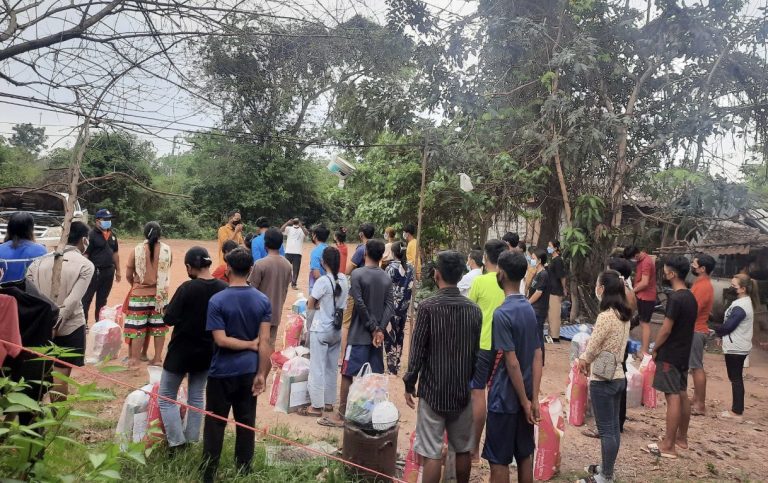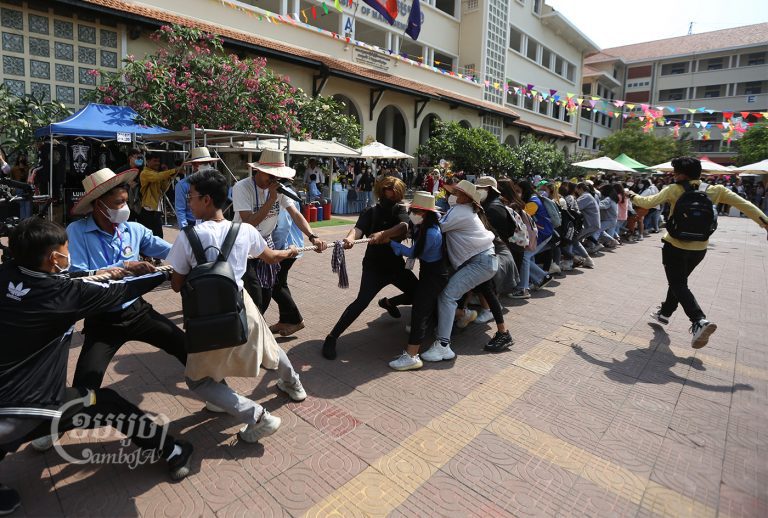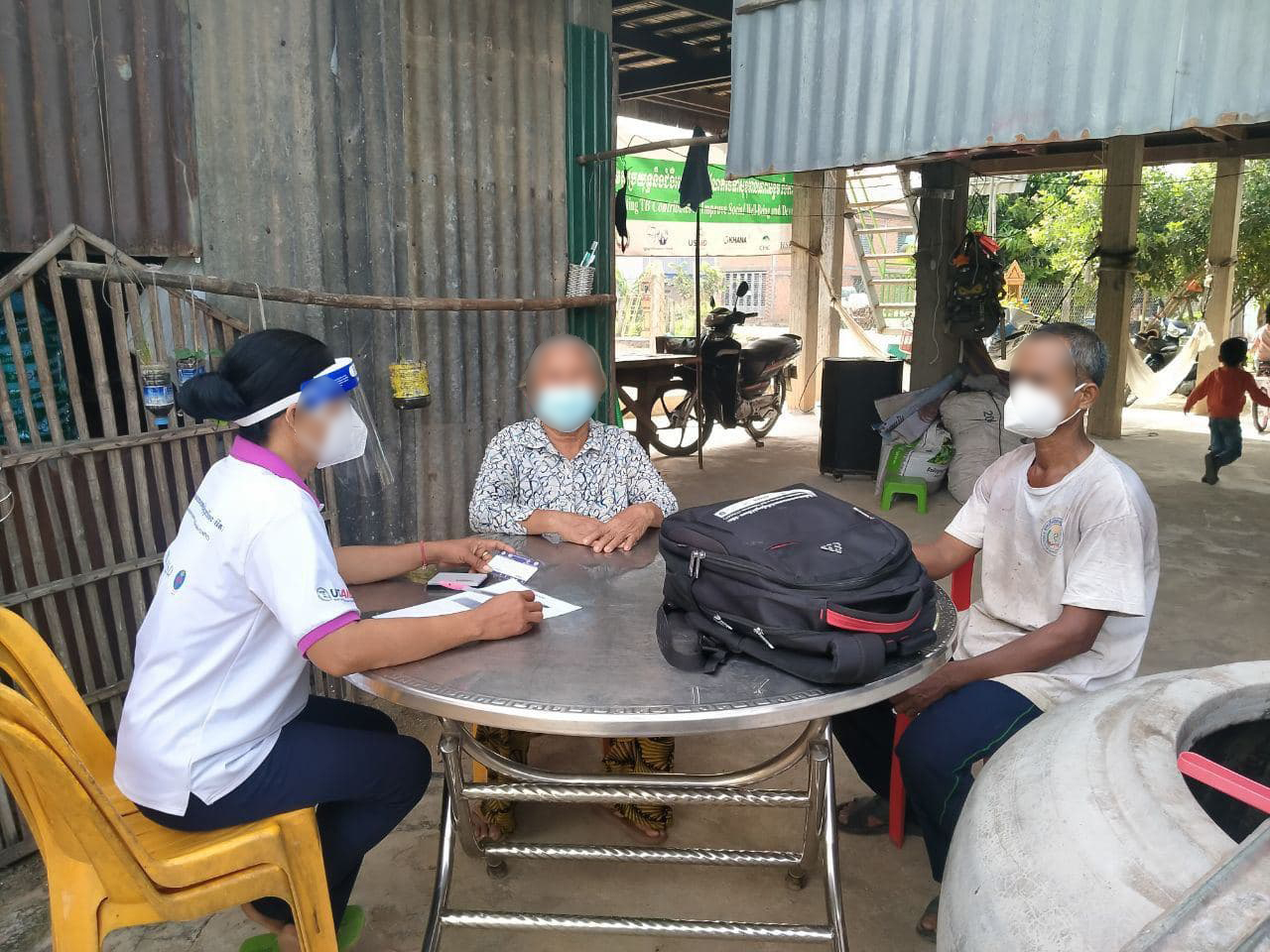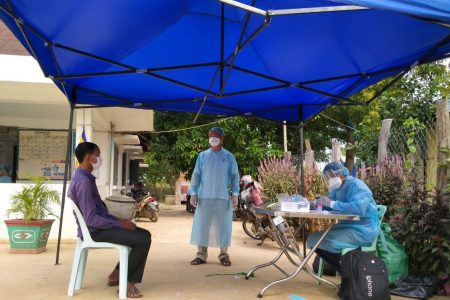Hundreds Cambodian migrant workers have been blocked from re-entering Cambodia since the government closed the Thai-Cambodian border Friday for two weeks to slow the spread of the Delta variant of COVID-19.
Loeng Sophon, a Thailand-based project officer for Cambodian labor rights group Central, said his group recorded at least 500 trapped workers at just two border checkpoints, though there were likely more.
“From July 29 until August 1, more than 300 migrant workers were blocked at O’Beichoan checkpoint and more than 200 people were blocked at Malai checkpoint,” he said, adding that he does not know whether any of the group was eventually allowed in, but that new workers have continued to make their way to the border checkpoints.
With the highly contagious Delta variant spreading in Thailand, many worksites have been closed, leaving Cambodian workers with little choice but to return home. But with cases surging in Thailand, Cambodia has been trying to keep both community outbreaks and imported cases in check.
As of August 2, Cambodia has detected a total of 223 new cases of Delta variant, according to the Health Ministry. In just two days, from July 31 to August 1, 109 new cases of the variant were found in many provinces and Phnom Penh.
Officials in several border provinces told CamboJA that they are trying to cope with the influx of workers to the border.
Soeum Bunrith, deputy governor of Battambang, said that despite the announced border closures, workers keep coming.
“It’s hard to be strict in people’s minds when they want to come. Some migrant workers come privately, and some illegally swim across the border lake. But we are standing by along the borders and sending them back to Thailand to stay temporarily in order to stop Delta spreading in Cambodia,” he said.
Thai authorities have prepared several centers near the border where migrant workers can be quarantined or treated for COVID-19 until the eight border provinces reopen. The Labor Ministry has asked Thai officials to coordinate with provincial administrations if they need aid or assistance, but no requests have yet been made, said Bunrith.
In Battambang, officials have recorded seven cases of Delta, all from migrant workers who returned prior to the lockdown. Bunrith said that those workers were sent to 21-day quarantine or treatment centers, and tested multiple times, given the severity of the variant.
In Banteay Meanchey, returning workers were rapid-tested at the border and sent to treatment or quarantine centers before the lockdown, said Roeun Sothy, deputy director of the Banteay Meanchey Provincial Health Department.
“There are no statistics of migrant workers coming to Cambodia since closing the border, but our colleagues are still on standby to monitor and prevent security to our people,” he said.
An Vannak, acting governor of O’Chrov district in Banteay Meanchey province, said local authorities have been working with their Thai counterparts to allow migrant workers to stay along the border until the lockdown lifts.
“We cooperated with Thai authorities to provide them with mosquito nets, blankets, and other equipment and we provide them meals three times a day,” Vannak said. “We check their health everyday, if they have a problem with their health we bring doctors to treatment or ask the permission to send them to the hospital.”
He said that in his district, there are 49 people who stay along the border and their health remains good.
Dy Rado, deputy governor of Oddar Meanchey Province said that since the announcement of the border closure, they have been preparing packages of noodles, canned fish, and cash for migrant workers. The province currently has 61 cases of Delta and 10 recoveries.
“We ask the Thai authorities to facilitate and call for Cambodian migrants to contact us if they have problems, then we will send our aid to them, but since lockdown until now there is no contact from them yet, but we are already preparing for them,” he said.
But reports from rights groups suggest a lack of coordination is leaving migrant workers in the lurch, with some complaining about insufficient medical care and food.
Soum Chankea, coordinator for rights group Adhoc in Banteay Meanchey province said that while Cambodian authorities had distributed some food and rice, more was needed.
“It is not enough [food assistance] for them because there were 63 unofficial checkpoints in Banteay Meanchey province,” he said. Some workers, said Chankea, after being blocked from entering Cambodia had simply set up camp in the forests—causing concerns for their health, as well as for the prevention of the spread of COVID.
“The government should have a plan about when they can return, where we can put them, and if they increase more and more, what can we do,” he said.
Srey Naren, Adhoc coordinator in Oddar Meanchey province, said other migrant workers had been locked down at their worksites, making it difficult to supply them with aid.
“Cambodian migrant workers who worked in the construction site, are locked down on the construction site as COVID-19 spreads seriously and they could not go out to buy medicine and foods to eat everyday,” he said.
Sophon, of Central, said migrant workers have been calling him and the Cambodian Embassy in Thailand asking for help to buy medication, saying they have been discriminated against at Thai hospitals.
“Some factory owners do not help and some ran away after migrant workers became infected COVID-19,” he added.
Koy Kuong, Foreign Affairs Ministry spokesman, could not be reached for comment on Tuesday. He wrote in Telegram group on August 2 that the Cambodian Embassy in Thailand has been working with its Labor Motivation Team to prepare 5,000 kits of rice, noodles, canned fish, and medicine to distribute to Cambodians who met with difficulties in provinces in Thailand.
On Tuesday, the Ministry of Health reported 577 new cases of COVID-19 including 224 imported cases, bringing the total count to 79,051 including 11,195 imported cases since the pandemic began in early 2020. The large majority of these cases have been recorded since February 20, when the ongoing community outbreak began in Cambodia. The ministry has also recorded 72,145 recovered cases and 1,471 deaths from the virus.



